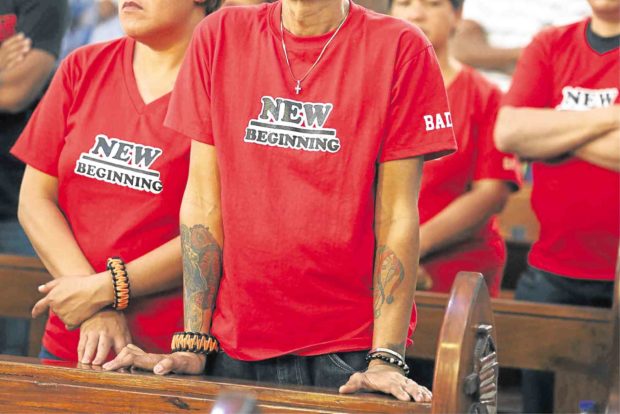Pangasinan cops overwhelmed by thousands of surrenderers

Drug surrenderers waiting to be processed. —NIÑO JESUS ORBETA
How do you solve a problem like thousands of drug surrenderers who suddenly descended on police stations in the first few months after the government declared total war against illegal drugs?
It was overwhelming, admitted the police in Pangasinan province, of the surrender of 19,444 drug users and pushers over the past 11 months.
“We never thought we would get that reaction [when President Duterte launched the war on drugs]. We were asking, ‘What are we going to do with them?” recalled Jeoffrey Tacio, Ilocos director of the Philippine Drug Enforcement Agency (PDEA).
From July 1 to Oct. 25 last year, 16,643 drug users and pushers trooped to different police stations in the province. They were joined by 2,759 more surrenderers from Oct. 26, 2016, to Jan. 31 this year, and 42 more in March.
Developing a host of community-based programs for those who have moderate addictions, and treatment for those severely addicted were the responses agreed upon by PDEA and other government agencies in the province.
Article continues after this advertisementTechnical courses
Article continues after this advertisementToday, 14,220 surrenderers have benefited from technical-vocational courses offered by the Technical Education and Skills Development Authority (Tesda), and from other livelihood projects, as well as moral recovery counseling and physical fitness programs.
Six of the surrenderers have graduated from a government rehab center, while 113 others are still undergoing rehabilitation.
Most surrenderers are also given counseling and are engaged in physical fitness sessions overseen by the local government and the police.
The provincial government is building a drug reform center at a 2-hectare lot in Burgos town as well. It can accommodate at least 200 drug dependents. The center opens this month and will be operated by the provincial government, according to Carlo Resurreccion, head of the provincial antidrug abuse council secretariat.
“We will assess drug dependents before they are accommodated (in the center). Mild cases will be referred to the center, while severe cases will be referred to the Department of Health’s treatment and rehabilitation center in Dagupan City,” he added.
Resurreccion said his office had designed a weeklong training program. “We will help the (surrenderes) get jobs through the provincial employment services office (Peso), or get involved in livelihood projects through the provincial population office.”
If there was one good thing that came out of the war on drugs, it was seeing several government agencies and the community work together, said Senior Supt. Ronald Oliver Lee, Pangasinan police director. —Gabriel Cardinoza